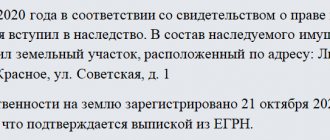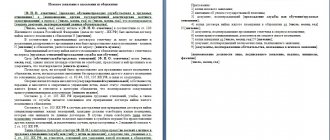Actual acceptance of inheritance after the established period
Real estate and land property, as well as expensive material property in the form of jewelry, transport, securities and other things, exist on the basis of private property and belong to certain individuals. Even if the rights to such property are terminated from individuals for objective reasons (death of the copyright holder), the property cannot disappear without a trace, therefore all rights are transferred by inheritance to persons under a will or in accordance with other procedures determined by the Civil Code of the Russian Federation.
The most common in legal practice is the procedure for accepting an inheritance under a will by drawing up an application addressed to a notary directly at the place where the entire material inheritance was opened. The legislation also provides for the procedure according to which the actual acceptance of the inheritance occurs after the expiration of the established period. Thus, the procedure is considered valid until it is documented that the legal heir voluntarily accepted the property, provided that the testator has performed any actions indicating acceptance of the inheritance.
Actions that are sufficient for the actual acceptance of an inheritance under a will upon expiration of the permissible period by law are the following cases:
- the person who inherits the property has taken possession or direct management of the inherited property;
- the heir has taken certain measures to preserve and protect property from destruction and interference by unauthorized persons;
- has incurred expenses necessary to improve or maintain real estate and property;
- paid the testator's debts.
What is the statute of limitations for inheritance?
The legislation provides for the possibility of submitting a request not only during a personal visit to the branch, but also through a representative or by mail. In the latter option, the number of contacting the notary will correspond to the number of sending the letter - in this case, it does not take into account when the documents actually arrive at the office.
If the outcome of the case is positive, the heir receives a certificate that confirms his right to use the property of the deceased
However, it is important to understand that in the future this fact can be disputed by any interested party - usually these are relatives who do not want to come to terms with the fact that they did not inherit anything
If one or more heirs were not notified of the opportunity to purchase the inheritance, then the issued certificate of title to the property may be invalidated during court proceedings
The three-year limitation period is reflected in Article 196 of the Civil Code of the Russian Federation. However, this provision contains a caveat - this applies to all situations, without taking into account specific conditions.
That is, if there are certain cases in an inheritance case, then the time frame for filing an application can be significantly expanded. After going to court, the plaintiff must provide compelling reasons for reinstating the deadline.
Such additions and conditions of the current legislation, taking into account the orders of judicial practice, often lead to the fact that many interested parties and close people of the testator, after many years, try to challenge the registered certificate.
In search of justice and compensation, they went to court. The government could not ignore the current situation for long, so on September 1, 2013, the legislation of the Russian Federation was supplemented with an additional clause, according to which the limitation period was set at 10 years.
Separately, it is worth considering the time frame for inheriting obligations, since often the heirs acquired not only the property of the deceased, but also his debts. At the same time, applicants are not always aware of such “surprises” in front of third parties or credit institutions - they could suddenly open up after a sufficiently long time has passed after taking ownership.
It is worth noting that a citizen is liable for the debts of the deceased only within a certain amount - no more than the amount of the value of the acquired property. That is, the creditor cannot force the heir to pay all debts if their size is greater than the appraised value of the property received.
Debts are distributed among all applicants who have taken ownership and have the appropriate certificate. The statute of limitations for debt collection by a creditor ranges from 3 to 10 years.
Valid reasons for missing the deadline for accepting an inheritance
The legislation of the Civil Code of the Russian Federation provides for a certain number of reasons that are considered valid and are taken into account when considering court cases about missing the deadline for accepting an inheritance. The most important reasons:
- the person who becomes the subject of receiving the inheritance was not aware or should not have been aware of the fact of receiving the inheritance;
- a serious illness of the heir, accompanied by serious disturbances in the functioning of the body and a chronic deterioration in health, the presence of which is evidenced by documentary evidence;
- helpless state, serious mental disorders;
- illiteracy of the heir.
According to the law, the unjustified reasons that became the reason for missing the permissible period for accepting inherited property include minor violations of the health and well-being of a person, ignorance of the peculiarities of civil legislation in matters of inheritance, as well as the lack of complete data on the composition of real estate and other tangible property. These reasons will lead to the refusal of the judicial authorities to satisfy the application.
Reasons for missing deadlines for inheritance
Article 1155 of the Civil Code of the Russian Federation establishes the right to enter into an inheritance after a missed period, if the reason for the omission is a reason justified by valid circumstances. However, the law has not established a complete list of reasons, which is why the courts are guided by the explanations of the Resolution of the Plenum of the Supreme Court of the Russian Federation No. 9 of 2012. So, in particular, the courts accept the following circumstances as justification according to paragraph 40:
- The heir did not have information about the death of a relative or should not have known about it.
- The citizen could not claim his rights due to a serious and long-term illness.
- The person was in a helpless state and could not exercise his civil rights.
- The heir was abroad and did not know about the existence of his right to inheritance, which is possible if contact information is lost or if there is a distant relationship and there are minimal chances for the property of the deceased.
- The citizen was sentenced to a long term and did not receive notification of the death of the same uncle or grandmother.
- The person was on a long business trip in an area with difficult communications.
- The heir was a minor who could not present his rights due to lack of legal capacity.
The following circumstances are not considered as justified circumstances for reinstating the missed deadline:
- Brief illness on the eve of the end of the six-month period for submitting documents to a notary.
- Lack of knowledge of inheritance procedures.
- Ignorance of the volume of inherited property.
Important! Each situation, as well as the validity of missing the deadline for entering into inheritance rights, is considered by the court individually, taking into account the reasonableness of the parties’ arguments.
Consequences of missing the deadline for accepting inheritance
The heir's failure to accept the deadline for taking ownership of the property is not an obstacle for the remaining heirs who claim the said inheritance, and will have certain consequences for the heir. Accordingly, all persons can accept such an inheritance, subject to the deadlines and legal procedures in accordance with the Civil Code of the Russian Federation.
If the permissible period for accepting an inheritance has expired, the potential heir has the right, in a pre-trial manner, to request permission from all heirs to receive part of the inheritance or, if there is reliable evidence, to demand an extension of the permissible period in court in order to eliminate the legal consequences.
Limitation period for reviewing an inheritance case
The law provides for a person’s right to review the decision on the division of property that occurred after the death of relatives. The procedure for restoring property rights consists of filing a lawsuit in court to restore the period for entering into inheritance. In the statement of claim, the citizen must indicate the circumstances that prevented participation in the division of property and a request for a review of the property rights of the relatives who accepted the inheritance. The appeal to the court occurs within the new period (six months counted from the date of completion of the inheritance case).
During the period allotted for the division and registration of inherited property, the leading role in organizing the process is given to the notary. The quality of the distribution of the hereditary mass largely depends on his actions, after which no controversial issues will arise. The invalidation of documents in judicial practice is often caused by the negligent attitude of officials to notify relatives.
Within the limitation period, there are cases of collision within the same authority. When separating the concepts of legal and actual inheritance, the second process is the judicial determination of the right to inheritance.
The actual entry into the inheritance is confirmed by the following documents:
- Spending your personal funds (fees, legal services, utility bills) for the maintenance of the inheritance;
- Payment of the deceased's obligations from personal funds;
- Receiving funds from an inheritance;
- Registration of ownership rights to the property of the deceased.
During such proceedings, the court re-checks the absence of other applicants. After such a decision, restoring your rights will be extremely problematic.
Extension of the period for accepting an inheritance
The legal renewal of the period for accepting an inheritance is possible in two ways, which are provided for in the civil legislative framework:
- In an extrajudicial manner, according to the law, it is possible to accept an inheritance only if the inherited property is claimed by persons who were able to accept the property on time. An important condition for carrying out such a procedure is the consent of all heirs to include an additional heir who has lost the allowable period;
- in court it is possible to demand the restoration of the permissible period for accepting an inheritance if the necessary documents and evidence are provided;
The reasons for restoring the period sufficient for accepting the inheritance may be the permission of all heirs to extend the period for an individual who did not accept the inheritance within the specified period.
If the heirs do not provide such consent, then the person by law has the right to apply to a judicial authority to resolve the problem in accordance with the evidence of the applicant.
Procedure for calculating the limitation period
Claims in cases related to inheritance issues are accepted for consideration by the courts in accordance with Art. 196 of the Civil Code of the Russian Federation, for 3 years from the date of the event in connection with which the claim is filed. In the vast majority of cases, the starting date of the time count in such cases is the day of death of the testator. But there are cases when this rule does not work and the starting point for the limitation period is determined by another date.
Such situations arise because the determination of the limitation period is regulated by Art. 191 of the Civil Code of the Russian Federation, according to which the beginning of the calculated period is considered to be the calendar day following the day of the event that occurred or the revealed fact for which the claim is filed.
The event in such cases is either the day of death or, under certain circumstances, the day the court makes a decision declaring a person dead. But the revealed fact may be the failure to receive timely notification of death or notification of the part of the deceased’s property due by law.
We suggest that you familiarize yourself with: Statute of limitations for bringing to administrative liability
According to paragraph 1 of Art. 192 of the Civil Code of the Russian Federation, the limitation period ends on the corresponding date and month of the last year. For example, if a relative died on March 15, 2002, then the last day to challenge the decision on infringement of rights will be March 16, 2005, provided that all procedures provided for by law are followed.
If this procedure was violated and the heir learned about his right to inheritance not after 6 months, i.e. not until 09/16/2002, but, for example, only 02/10/2003, then, in accordance with Art. 200 of the Civil Code of the Russian Federation, the statute of limitations for entering into inheritance will be counted from this day and will end on 02/11/2006.
If the statute of limitations in an inheritance case has expired, then if there is a good reason, for example, if a person was on a long business trip and could not be notified of the death of a relative in time, the heir has the right to file an application with the court to restore this period. But this becomes possible only if the inheritance was not previously accepted by him, either legally or in fact. However, such an application must be submitted to the court no later than six months after the expiration of the reason for missing the deadline.
Inheriting the property of deceased relatives very often becomes a cause of discord between loved ones. Therefore, despite the fact that the procedure for its adoption is written out in very detail and clearly, it is better for relatives entitled to inheritance to agree on all the nuances of inheritance among themselves, rather than bring the matter to court.
Remember that the acquired property, no matter how expensive it may be, may turn out to be a mere trifle in comparison with the loss of friendship and help from relatives.
Grounds for restoring the period of acceptance of inheritance
The legal basis in accordance with the Civil Code of the Russian Federation for the restoration of time sufficient for the full acceptance of the inherited property is the heir’s appeal to the judicial authorities with a corresponding application.
In the document, the person indicates all the reasons that became fundamental for missing the deadline.
Otherwise, the request will be refused.
During the trial, the fact that all the circumstances that became the reasons for the omission have disappeared is clarified.
The heir must apply within six months after the expiration of the period for accepting the inheritance to the judicial authority with reliable evidence that indicates the actual absence of all circumstances that will again prevent the heir from accepting the inheritance.
The procedure for restoring the period for accepting an inheritance
Restoring the deadline for accepting an inheritance can be done pre-trial or in court. The pre-trial procedure involves filing the following documents:
- written consent of all heirs who previously accepted the specified property;
- certificate of the right to receive inheritance from an authorized notary.
The procedure for restoring the deadline in court is carried out in accordance with the following algorithm:
- drawing up a statement of claim and paying state fees;
- submission of documentation;
- obtaining a court decision regarding the claim.
How is the statute of limitations for inheritance calculated?
According to the law, the statute of limitations for an inheritance case is at least 3 years and should not exceed 10. Calculation begins with the opening of an inheritance case. It opens the day after the death of a citizen or after the fact of his death is established in court. The fact of death is established by the court, for example, if a person goes missing.
The beginning of the calculation is made in cases where the testator has left a will, all claimants to the property have been notified of the death of a relative and have written statements stating that they are claiming their share.
Those who did not manage to meet the deadline have the opportunity to sue their part of the property, since the legislation, having determined the limitation period for inheritance, made it possible for the heirs to receive what was bequeathed to them or due by law.
Counting order
The limitation period is calculated from 2 positions:
- From the moment when the heir learns or should receive information about the right to a share in the inheritance.
- From the day of the death of a relative.
The notary opening the inheritance case must find out whether all the heirs have been found and notified of the death of the testator. If at least one of the applicants is not notified, the statute of limitations begins to count for him. The limitation period is calculated continuously, unless force majeure occurs. The Civil Code stipulates the possibility of interruption, suspension and renewal of the term.
Force majeure situations include, for example, those when a citizen cannot defend his rights while being seriously ill. As soon as the obstacles disappear, the statute of limitations continues to run. In the final calculation, time periods with obstructive situations are cut out. The presence of all obstacles must be documented.
Citizens often confuse two concepts: the period for accepting the property of the deceased by right of inheritance and the statute of limitations. It is necessary to distinguish between them, since, despite the fact that they are interrelated, the limitation of periods is established to achieve different goals. Acceptance of an inheritance within 6 months implies the period of entry into inheritance.
6 months is enough time to document the relationship with the deceased. If he left a will, this simplifies the procedure for entering into an inheritance, since the will of the testator is the basis for the distribution of the inheritance.
The statute of limitations for inheritance means the possibility of “late” applicants entering into the inheritance.
Documents for restoring the period for accepting an inheritance
The process of renewing the period sufficient for the acceptance of inherited property is accompanied by judicial proceedings. To make a positive decision and successfully complete the legal process, the potential heir must provide the following package of documentation to the judicial institution:
- a statement of claim on behalf of the recipient of the inheritance with a requirement to restore the time for accepting the inherited property, which must correspond to the established model;
- copies of this statement of claim in the quantity corresponding to the number of third parties and the defendants;
- a paper indicating the fact of payment of the state duty;
- if at the court hearing the interests of the heir will be represented by his legal representative, then a notarized power of attorney must be provided to perform the necessary actions;
- the interests of minor heirs must be represented by their legal guardians;
- evidence that confirms the existence of circumstances that became the reasons for missing the deadline. It is important to submit these documents in accordance with the number of persons on the defendant’s side;
- reliable evidence that fully confirms the heir’s compliance with all legal requirements and compliance with the pre-trial regime. These actions are necessary for the preliminary settlement of the dispute, if the law provides for such an option;
- a document indicating the disputed amount of monetary compensation.
The statement of claim for the legal renewal of the period sufficient for acceptance of the inheritance must comply with the established template.
The document must contain personal information about the applicant and the testator.
It is also important in the claim to indicate reliable reasons that became the reason for missing the deadline and the fact of payment of the state duty.
In the appropriate column of the claim, the applicant must indicate all citizens who claim to receive the specified property, in addition to the applicant. In the final part of the application, the person indicates the date and certifies the document with his signature.
Limitation period for inheritance of real estate
/ Inheritance / Limitation period for inheritance of real estate
When we talk about the time frame associated with inheritance, 6 months for accepting an inheritance comes to mind. Many heirs are absolutely sure that after the expiration of this period it is no longer possible to resolve controversial issues. But that's not true.
In this article we will understand what the statute of limitations is, how long it lasts and what it is needed for.
So, everything is clear with the duration of the limitation period in inheritance cases - it is at least 3 years, but does not exceed 10 years. All that remains is to figure out the beginning of the countdown and the procedure for calculating the limitation period.
In the vast majority of cases, the countdown begins on the day after the opening of the inheritance (that is, the day after death or after the court decision to recognize the testator as deceased comes into force).
This calculation is used in simple inheritance cases in which all heirs participate, notified of the death (or recognition as deceased) of the testator, the presence (or absence) of a will, and the procedure for dividing the inherited property.
For example, after untimely receipt of notification of the death of a relative, after receiving information about the will he left, about a violation of inheritance law, about hidden or illegally appropriated, illegally distributed inherited property.
If the expiration of the limitation period falls on a weekend or holiday, it is postponed to the first working day after the non-working day.
If a person finds out that he has the right to the testator’s property after 10 years, then he has the right to file a claim in court to prove that his inheritance rights have been violated. Such cases are special. Before the meeting, the judge sends a request to the notary office where the case was opened in order to receive all the materials to complete the picture.
During the trial, it is important for the heir to prove that his right was violated. If the judicial authority finds the claims justified, the inheritance case will be reviewed
In this case, it will not matter that the statute of limitations has already passed.
To exercise your right to inherited property, the law establishes a specific period of 6 months. During this time, the heirs must have time to prepare all the necessary documentation and send an application to the notary's office.
The notary will need the following documents:
- Successor's passport.
- A certificate establishing the fact of the death of the testator.
- A document confirming relationship with the deceased.
- Will.
- Papers for property owned by the deceased.
- A certificate indicating the address where the person was living at the time of death.
- Receipt confirming payment of the state duty.
The application and papers must be submitted within six months, and the inheritance certificate is issued only after this time.
Recovery
There are situations when successors miss the deadline for submitting an application to the notary's office. In this case, there is a chance to restore it. You can do this in two ways:
- Having agreed with the remaining heirs and concluded a peace agreement with them, which is then handed over to the notary.
- File a lawsuit with a request to restore the deadline. If the judge is on the plaintiff’s side, he will make a decision, a copy of which must be given to the notary’s office. In this case, the consent of the other successors is irrelevant.
If the heir appeals to the judicial authority, he must prove that he missed the deadline not on his own initiative. The law does not define which circumstances are considered valid. Respectfulness is determined by the judge at his own discretion.
Most often it is recognized if the citizen:
- Didn't know that the testator had died or indicated him in his will.
- He was under treatment for a long time due to a serious illness or being in a coma.
- I was on a long business trip.
Simply coming to court and explaining the reason for missing the deadline will not give a positive result.
It is important for the heir to collect evidence in the form of documents and testimony. For example, to confirm a serious illness, you will need a medical report; when traveling on a business trip, you will need a certificate from your place of work, and so on.
Thus, the limitation period is a minimum of 3 years and a maximum of 10 years. The law allows 6 months to register an inheritance.
Refusal to restore the deadline for accepting an inheritance
The judicial authority may refuse to renew the period for accepting the inheritance to the applicant in the following cases:
- the heir did not comply with all legal requirements and the established procedure;
- the stated reasons turned out to be unjustified;
- the citizen did not pay the state duty;
- the person did not provide a sufficient list of documents;
- the citizen filed the application later, within six months from the date of termination of certain circumstances.








